Christianity is dying in its birthplace.
Nazareth, a formerly predominantly Christian Arab town, is mostly Muslim now and tourists, visiting the Roman Catholic Basilica of the Annunciation, are confronted by banners in Arabic denying the deity of Christ.
Bethlehem was 84 percent Arab Christian when the state of Israel was proclaimed in 1948. Now the city’s Christian population has fallen to about 10 percent.
The decline of the Palestinian economy, strangled by Israeli constant harassment, by the massive security wall, and by the rise of militant Islamic fundamentalism, has compelled many to leave.
And yet, Christmas continues to be celebrated by the beleaguered Christian community and a trickle of Western tourists. Christmas services are still conducted in Bethlehem’s Church of the Nativity, visiting choirs sing, Palestinian Boy Scout bagpipers play and one or two young Palestinian boys are dressed as Santa Claus.
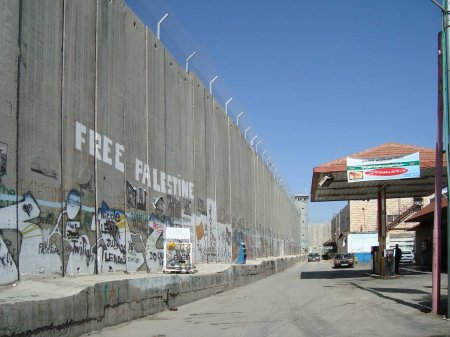
When US President Donald Trump announced that the US embassy will be moved from Tel Aviv to Jerusalem, practically recognizing Jerusalem as Israel’s capital and putting an end to any peace plans based on a “two state solution,” Nazareth canceled some Christmas celebrations in protest, but the town’s market stalls and the traditional Christmas church services will be held as they are every year.
Bethlehem and Ramallah briefly switched off their Christmas lights. A symbolic, meaningless, inconsequential protest. The local merchants cannot afford to lose the remaining tourism income.
Stating the obvious
Trump’s announcement is not as brazen as it appears at first glance, it is only “the recognition of reality,” as he himself says. The announcement is also not going to undermine peace efforts — because there are no peace efforts underway.
The announcement is not a new initiative or a policy change. Pro-Israel lawmakers in Congress, led by Democrat Diane Feinstein, orchestrated a law already in 1995 mandating the embassy move, but were giving the president a way out — the president could waive the requirement. Every president since took advantage of that waiver, Trump didn’t, and with the implementation of the bill even fulfilled an election campaign promise. The bill in 1995 btw passed with the support of 90 senators, it was clearly a bipartisan action.
Trump needs to placate his key Israel-backing donors, particularly the casino mogul Sheldon Adelson, and the Christian evangelicals, an Israel-friendly component of his rightwing base.
Trump’s Jewish son-in-law Jared Kushner, senior adviser and concerned with Middle East negotiations, is another guarantor, that Israeli interests have priority. Kushner has been a supporter of Israel’s settlements for years, his family’s foundation donated money for a Jewish seminary in the settlement Beit El and also for several other educational institutions in settlements.
There are also Jason Greenblatt, Ronald Lauder, David Friedman, Boris Epshteyn, Stephen Miller, Lewis Eisenberg, Michael Glassner, just to name a few other Jewish members of Trump’s inner circle.
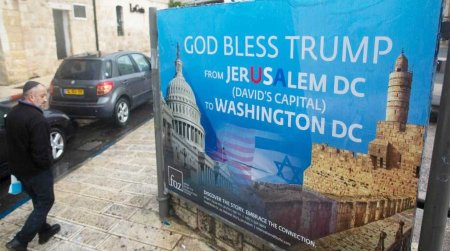
Israel occupied the east of Jerusalem, previously held by Jordan, in the 1967 Six Day War and since then regards the entire city as its indivisible capital. The fact, that Israeli sovereignty over Jerusalem has never been recognized internationally, and that all countries currently maintain their embassies in Tel Aviv, is not more than a slight inconvenience. As long as Israel’s lobby in Washington ensures US commitment, nothing else matters.
And as long as 3.8 billion of US tax dollars are sent to the Israeli military every year, new Jewish settlements can be built unhindered, and US veto power protects Israel in the UN, any protests, declarations, petitions, resolutions will be ignored or laughed at.
US violations of international law regarding Israel are commonplace, are an old story, they never led to any repercussions and never caused any trouble for the US-Israel axis.
A muted response
Palestinians predictably have been protesting Trump’s announcement and hundreds have been arrested by Israeli forces, including Fatah leaders in Jerusalem. A dozen Arabs have been killed so far in the West Bank and Gaza Strip, a few rockets were fired from Gaza and Israeli jets destroyed buildings and infrastructure in retaliation.
The leader of Egypt’s Coptic Church, Pope Tawadros II, cancelled an upcoming meeting with US Vice President Mike Pence in protest against Washington’s move.
Pope Francis said he “cannot silence deep concern” over the issue. “Jerusalem is a unique city, sacred for Jews, Christians and Muslims,” holding a “special vocation for peace.” He added: “I pray to God that this identity is preserved and reinforced, for the sake of the Holy Land, the Middle East, and the whole world, and that wisdom and prudence prevail.”
He is a holy man and well intended, but in a world of bombs, rockets, and nuclear warheads his words are spoken in the wind.
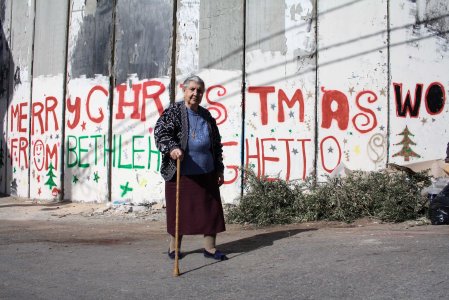
The USA vetoed a UN Security Council resolution, drafted by Egypt, which affirmed that any decisions on the status of Jerusalem were “null and void and must be rescinded,” and which urged all states to “refrain from the establishment of diplomatic missions in the holy city“.
US President Donald Trump threatened to cut off financial aid to countries who back a United Nations resolution opposing the recognition of Jerusalem as Israel’s capital. “Let them vote against us. We’ll save a lot. We don’t care.” US Ambassador Nikki Haley warned in a letter to member states that they should “know that the president and the US take this vote personally […] The president will be watching this vote carefully and has requested that I report back on those countries who voted against us. We will take note of each and every vote on this issue.”
In the end, 128 nations voted for the resolution in the UN General Assembly, only 9 objected, 35 abstained. A resolution of the UN General Assembly though is non-binding.
Palestinian President Mahmoud Abbas said that the Palestinian leadership plans to submit applications to join 22 international organizations to which Palestinians have a right to full membership. Senior members of the Palestinian leadership received a direct message from Abbas that they were to treat the Trump administration as hostile and challenge its decisions in any and every international forum, whatever the cost. Trump’s two envoys Jared Kushner and Jason Greenblatt are persona non grata in the Palestinian territories.
Criticism of Trump’s move poured in from Damascus to Cairo to Tehran to Ankara, but it is still all talking, not one concrete measure, no economic or military actions.
Mahmoud Abbas met with Saudi Arabias King Salman and Crown Prince Mohamed bin Salman to discuss the new situation, but Saudi Arabia doesn’t want to jeopardize its covert military cooperation with Israel.
Jordan, Egypt, Saudi Arabia, UAE, Kuwait are US allies and heavily dependent on military cooperation and coordination with the West. These countries are not expected to act against their political self-interest.
Economic ties with Israel are also not in danger, a 25-member Bahraini delegation just visited Israel to “send a message of peace,” and in return a delegation of Israeli business leaders will travel to Bahrain in January to discuss various projects.
An extraordinary summit of the OIC (Organization of Islamic Cooperation) on December 13 in Istanbul was only attended by 16 heads of state and only 30 of the 57 OIC members showed up. Saudi Arabia, the UAE, and Egypt were absent while the Gulf media was full of attacks against Turkish President Erdogan, trying to downgrade the value and accomplishments of the Istanbul summit.
Ali Abunimah, co-founder of the Electronic Intifada, summed it up and lashed out at Arab leaders for wasting everyone’s time. He asserted that meetings of Arab foreign ministers or Islamic summits will amount to nothing, arguing that all the statements being made “are strictly for public consumption.”
Extermination of a dream
The peace process was a charade even before Trump’s announcement. There was endless talking while Israel unilaterally established more and more facts on the ground that were impossible to reverse. Palestinians were asked to compromise, and compromise again, and compromise more.
The Oslo Accords in 1993, the pretense of a peace process, and the vague talking about a “two-state solution” has kept Palestinians chained to an illusion. The perpetuation of false hope about statehood did not benefit Palestinians; it preserved a calm that aided Israel.
This is why the US administration accused Mahmoud Abbas of walking away from dialogue. This is why just a week before the announcement about Jerusalem, the Trump administration threatened to close the PLO office in Washington if the Palestinians didn’t accept Washington’s terms for new negotiations.
Ordinary Palestinians in Jerusalem may be the first to capitulate and adjust to the harsh reality — accepting that a Palestinian state is dead and buried. In recent years, growing numbers have started applying, as Israeli law entitles them to, for Israeli citizenship.
They will be second class citizens, they will be at the bottom of the social order, but they will be allowed to live on at the margin of Israeli society, being cheap laborers and obedient servants.
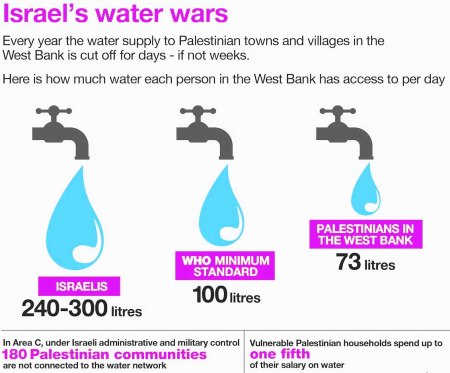
What’s going on in Jerusalem is what has been going on in Palestine since 1948 — it is the robbing of Palestinian land, it is the destruction of Palestinian identity and heritage. Palestinians are vermin, as various Israeli politicians stated over the years, and who would feel compassion or pity for vermin?
Israel makes the lives of Palestinians in the occupied territory as miserable as possible. Settlers burn down olive orchards or poison the wells of their Palestinian neighbors while Israeli security forces turn a blind eye, settlers regularly kill Palestinians with impunity.
6,000 Palestinians are in Israeli prisons, many in administrative detention without trial. Countless examples of torture were documented by NGOs.
Repairs of water and sewage pipes are not allowed under specious excuses or delayed with bureaucratic hurdles. Hundreds of water and sanitation structures have been demolished by Israel on grounds that they were lacking official permits, while restrictions on drilling, deepening, and rehabilitation have made existing wells unusable.
The West Bank’s mountain aquifer and the Sea of Galilee provide about 60 percent of Israel’s fresh water. Israel and Israeli settlements use 86 percent of the aquifer’s flow, leaving the Palestinians with 14 percent. While aquifers in the Westbank are used up for Israeli cities, Toxic waste is dumped onto Palestinian land, contaminating precious groundwater.
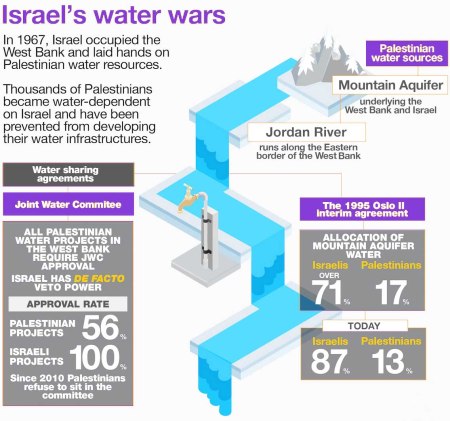
351 Palestinian buildings have been destroyed and 528 people displaced alone this year. An estimated 48,000 buildings have been razed since 1967. House demolitions are usually done without prior warning and the home’s inhabitants are given little time to evacuate. The demolitions include schools and other municipal buildings.
Demolitions are justified as enforcement of building codes and regulations, by lack of permits (which are never granted by Israeli authorities), as counter-insurgency measures, or as collective punishment against families of accused terrorists.
During the Second Intifada, Israeli forces started big scale house demolitions following a wave of suicide bombings. The military also uses a tactic, called “Pressure Pot,” where houses of suspected Palestinian fighters and activists are surrounded and the occupants ordered to come out. After short waiting the house is bulldozed, killing everybody who didn’t come out.
During the 2002 Battle of Jenin and in Operation Rainbow (Rafah 2004), house demolitions by armored Caterpillar D9 bulldozers were used to widen alleyways, uncover tunnels, or secure positions of Israeli troops. More than 1,000 people were left homeless in the Rafah Refugee Camp.
In 2003, US peace activist Rachel Corrie was killed by a bulldozer as she tried to prevent a demolition in Rafah. The driver of the bulldozer was exonerated by an Israeli court, all appeals against this judgement were rejected.
A Human Rights Monitor report with the title “squandered aid” asserts that, since 2001, Israeli authorities have destroyed around 150 development projects by the European Union, causing a financial loss of more than 68 million US$. The destroyed projects included for instance solar panels on the roof of a school in a Beduin village which where the only source of electricity there. The school itself was also torn down.
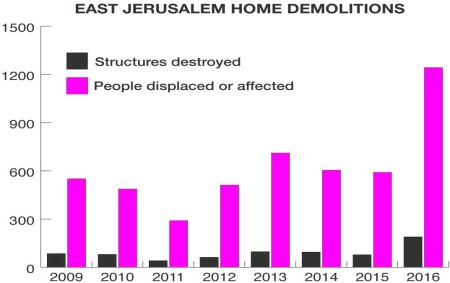
The Gaza Strip is the worlds biggest concentration camp. Israel imposed sanctions after Hamas won the Palestinian legislative election in 2005. In 2007, after Hamas seized government institutions and replaced Fatah officials with Hamas members, Egypt and Israel closed most Gaza border crossings. Gaza’s manufacturing sector shrunk by 60 percent, all exports stopped.
Israel blocks not only goods which could be used eventually for military purposes, but also basic supplies, including building materials (cement, glass, steel, bitumen), medicines, food. Many items are rejected by Israel as “luxuries” or are not allowed in for unexplained reasons.
According to UN officials Israel has blocked shipments of jam, candles, books, wheelchairs, dry food, musical instruments, shampoo, A4 paper, and livestock (chicken, donkeys, cows). The aid group Mercy Corps said it was hindered to sending 90 tons of macaroni and other foodstuffs.
Palestinian President Mahmoud Abbas approved the Gaza blockade, he supported Egypt’s crackdown on smuggling tunnels, which were Gaza’s last lifeline to the outer world, and he welcomed the flooding of tunnels by Egypt. Abbas also objected to the entrance of Qatari fuel to the Gaza electricity plant via Israel, because the Palestinian Authority would not have been able to collect taxes on the fuel.
In 2017, at least 20 patients in the Gaza Strip died after not being allowed to access medical treatment in Israel or the West Bank.
After a visit to the Gaza Strip in August UN Secretary General Antonio Guterres said he was “deeply moved” to see the suffering of Gaza’s two million residents. “It is unfortunate to witness one of the most dramatic humanitarian crises that I’ve seen in many years.” Bevor that in July a UN report found that the Gaza Strip was now “unlivable.”
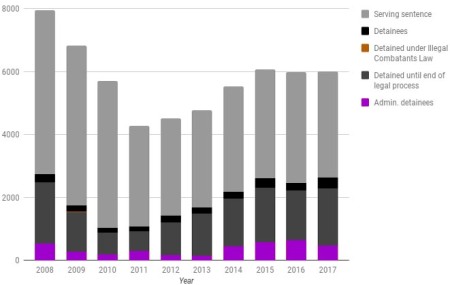
It is not just the right-wing government of Benjamin Netanyahu and Avigdor Lieberman, it is not just orthodox Jews and radical settlers. Israeli Jewish society ist united in the desire to eliminate native Palestinians from the occupied territories and pursue the dream of Eretz Israel, not ruling out further expansions into Lebanon (Litani River valley) and Syria.
Retired general Amiram Levin, a rising star in the Labor Party, called for more settlements and said that in a future war the army should forcibly transfer all Palestinians to “the other side of the Jordan River.”
Self inflicted wounds
The Arab League, with Gamal Abdel Nasser’s Egypt playing a leading role, created the PLO (Palestine Liberation Organization) in the 1960s. Only a few years later, the PLO came under the control of Yasser Arafat’s Fatah movement, resisting outside pressure and pursuing an independent path.
Since then various regional and world powers tried to gain control of the Palestinian leadership with bribes and through infiltration by covert agents.
Israel’s Mossad, CIA, MI6, and many other agencies are at work. No one can blame Palestinians for being paranoid. Suspicion and mistrust permeates Palestinian society — crooks use this social climate to get rid of rivals. Hamas has executed hundreds of “traitors.”
The second Intifada from 2000 to 2005 not only led to the death of 3000 Palestinians, but also caused a deep economic recessions, as Palestinian GDP per capita shrunk by almost 40 percent. When the intifada broke out, PLO leader Yasser Arafat hinted by way of omission that he no longer opposed violence.
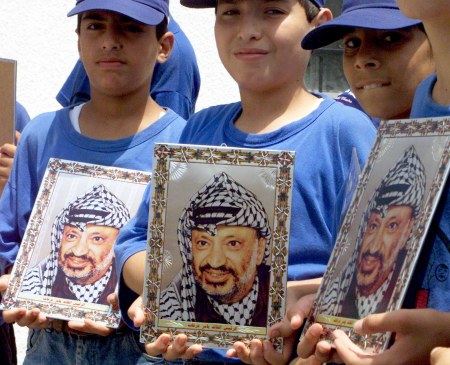
After Yasser Arafat’s death in 2004 Mahmoud Abbas took over, ending the bloodshed of the second Intifada in 2005. This was in some respect an achievement, but the PA (Palestinian Authority) after that apparently represented the interests of no one outside of Abbas, his fellow officials, and cronies who all took their cut of foreign aid and grants from the European Union, Canada, the USA, Japan, and some affluent Arab countries.
Under Abbas, the Palestinian police, completely destroyed by Israel in the second Intifada, was rebuilt, but mainly used to quell internal dissent and prevent resistance against Israel. Arbitrary arrests and torture are common. A security cooperation with Israel turns the police into a tool of the Israeli occupiers.
Avigdor Lieberman boasted, that the only reason Abbas remains in power is because he maintains security coordination with Israel, and hinted that the Palestinian president would not dare to abandon the arrangement.
Mohammed Dahlan, suspected to be involved in the poisoning of Arafat, and promoted by the West and Gulf states as possible successor of Abbas, has fortunately been sidelined and expelled, but there are surely other agents of outside powers, who lie low and have not been uncovered yet.
Marwan Barghouti, the most popular and very likely also the most integer Palestinian leader, has been imprisoned by Israel since 2002.
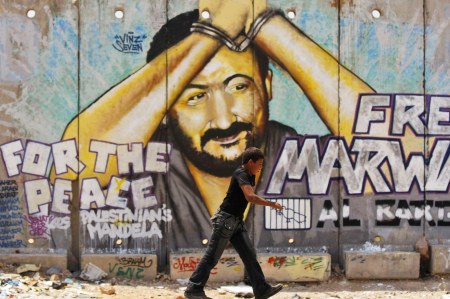
Hamas, an offshoot of the Muslim Brotherhood and ruling Gaza since 2007, was first funded by the Gulf states, then by Iran, and after the start of the Syrian war, where Hamas took side of the Islamist rebels, by Qatar. Hamas defeated Fatah in a democratic election because Gaza’s population was frustrated about Israeli occupation and empty Western promises of peace and self-rule.
Hamas naturally sympathized with their fellow Islamists in Syria, but they betrayed the most sincere and reliable supporter of Palestinian resistance. Since 1948 Syria had given shelter to Palestinian refugees. Arab solidarity was not a hollow phrase for Syrian leaders, it was real, it was a pillow of Syrian politics. Palestinians had nearly the same rights as Syrians, they prospered and the big refugee camps in Yarmouk and Handarat became upscale suburbs of Damascus and Aleppo.
Yarmouk and Handarat are destroyed now by the Islamist onslaught. Radical imams recruited unemployed Palestinian youth from refugee communities for rebel brigades. This happened not only in Syria but also in Lebanon and Jordan.
There are many Palestinians who fight against the Islamists and take part in crucial military operations. Quwat al-Jalil, (Galilee Forces), Liwa al-Quds (Jerusalem Brigade), Liwa al-Jalil (The Galilee Brigade), and the PFLP-GC (Popular Front for the Liberation of Palestine-General Command) under Ahmed Jibril. Liwa al-Quds conquered Handarat Camp north of Aleppo in heroic fighting. Handarat was their home, and though it is now a moonscape of ruins and rubble, they finally can start to rebuild it.
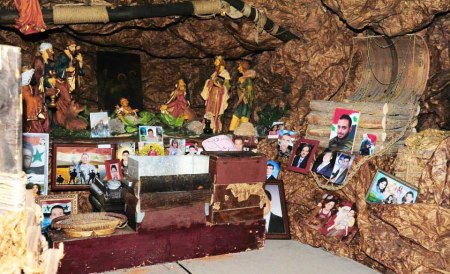
The Palestinian refugees who took up arms against the Syrian government, falling pray to the Wahhabi pied-pipers, only did hurt themselves. Though the Islamist brigades are largely defeated and the war is slowly coming to an end, Syria is devastated and weakened. It cannot support the Palestinian cause anymore, it cannot be a deterrent to Israeli repression.
The Palestinians wo joined Hamas or Islamic Jihad likewise weakened the Palestinian struggle for self-determination. They gave Israel the perfect pretext to crack down and destroy what is left of Palestinian social institutions and infrastructure.
The Palestinian Islamists in their narrow minded worldview hassle and intimidate Christian Arabs. Infidels, Kafirs they are, an annoyance, aliens, who have to be chased away. So the Christians leave Palestine, weakening the resistance against Israeli occupation even more.
In the Syrian cities and towns of Aleppo, Maaloula, Homs, Hasakah, Sadad, Mahrada, and Sqailbiyeh, Christians are safe again and can start to rebuild. In Palestine, they are under attack by both the Israeli occupiers and their fellow Palestinians of Islamic faith. Religious zeal is apparently more powerful than solidarity against oppression.
Defense of the defenseless, hope for the hopeless
Arab empathy with their Palestinian brethren continues to be strong and Arabs still pour out into the streets, as it happened for instance in response to Israel’s installation of new security measures at the al-Aqsa Mosque, but what use have demonstrations and protests when Arab leaders covertly and even openly collude with the US-Israel axis?
Banksy, an anonymous street artist, teamed up with the Oscar-winning director Danny Boyle to stage a nativity play in the shadow of Bethlehem’s barrier wall. The audience will be mostly local families and journalists, but some British newspapers and the BBC have taken notice.
The BDS-movement still limps on, ignored by mainstream media.
Bloggers like Electronic Intifada and activists like Eva Bartlett continue to inform.
Celebrities like Roger Waters, Brian Eno, Chuck D, Danny Glover, Stephen Hawking, Mark Ruffalo, Whoopi Goldberg, Russell Brand, and others support Palestinian independence.
In November thousands protested in London against the Balfour Declaration and Prime Minister Benjamin Netanyahu’s visit to the British capital.
Every little bit helps. What else could one say? What else could one do?
Further reading:
https://mato48.com/2017/07/25/israel-in-syria-and-the-cardinal-sin/
https://mato48.com/2015/10/18/i-wish-to-resign-and-cease-to-be-a-jew/
https://mato48.com/2014/03/24/about-collaborators-agents-and-spies/
https://mato48.com/2014/02/03/the-middle-east-water-war/
https://mato48.com/2014/01/19/syrias-betrayal-by-palestinian-jihadists/
https://mato48.com/2013/12/27/the-bethlehem-story-and-present-reality/
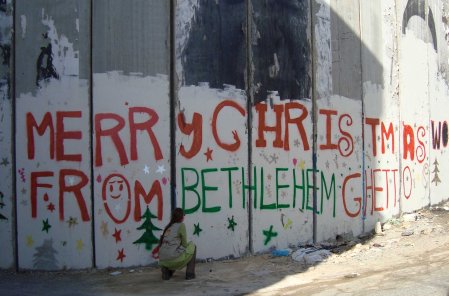
Nazareth, a formerly predominantly Christian Arab town, is mostly Muslim now and tourists, visiting the Roman Catholic Basilica of the Annunciation, are confronted by banners in Arabic denying the deity of Christ.
Bethlehem was 84 percent Arab Christian when the state of Israel was proclaimed in 1948. Now the city’s Christian population has fallen to about 10 percent.
The decline of the Palestinian economy, strangled by Israeli constant harassment, by the massive security wall, and by the rise of militant Islamic fundamentalism, has compelled many to leave.
And yet, Christmas continues to be celebrated by the beleaguered Christian community and a trickle of Western tourists. Christmas services are still conducted in Bethlehem’s Church of the Nativity, visiting choirs sing, Palestinian Boy Scout bagpipers play and one or two young Palestinian boys are dressed as Santa Claus.

When US President Donald Trump announced that the US embassy will be moved from Tel Aviv to Jerusalem, practically recognizing Jerusalem as Israel’s capital and putting an end to any peace plans based on a “two state solution,” Nazareth canceled some Christmas celebrations in protest, but the town’s market stalls and the traditional Christmas church services will be held as they are every year.
Bethlehem and Ramallah briefly switched off their Christmas lights. A symbolic, meaningless, inconsequential protest. The local merchants cannot afford to lose the remaining tourism income.
Stating the obvious
Trump’s announcement is not as brazen as it appears at first glance, it is only “the recognition of reality,” as he himself says. The announcement is also not going to undermine peace efforts — because there are no peace efforts underway.
The announcement is not a new initiative or a policy change. Pro-Israel lawmakers in Congress, led by Democrat Diane Feinstein, orchestrated a law already in 1995 mandating the embassy move, but were giving the president a way out — the president could waive the requirement. Every president since took advantage of that waiver, Trump didn’t, and with the implementation of the bill even fulfilled an election campaign promise. The bill in 1995 btw passed with the support of 90 senators, it was clearly a bipartisan action.
Trump needs to placate his key Israel-backing donors, particularly the casino mogul Sheldon Adelson, and the Christian evangelicals, an Israel-friendly component of his rightwing base.
Trump’s Jewish son-in-law Jared Kushner, senior adviser and concerned with Middle East negotiations, is another guarantor, that Israeli interests have priority. Kushner has been a supporter of Israel’s settlements for years, his family’s foundation donated money for a Jewish seminary in the settlement Beit El and also for several other educational institutions in settlements.
There are also Jason Greenblatt, Ronald Lauder, David Friedman, Boris Epshteyn, Stephen Miller, Lewis Eisenberg, Michael Glassner, just to name a few other Jewish members of Trump’s inner circle.

Israel occupied the east of Jerusalem, previously held by Jordan, in the 1967 Six Day War and since then regards the entire city as its indivisible capital. The fact, that Israeli sovereignty over Jerusalem has never been recognized internationally, and that all countries currently maintain their embassies in Tel Aviv, is not more than a slight inconvenience. As long as Israel’s lobby in Washington ensures US commitment, nothing else matters.
And as long as 3.8 billion of US tax dollars are sent to the Israeli military every year, new Jewish settlements can be built unhindered, and US veto power protects Israel in the UN, any protests, declarations, petitions, resolutions will be ignored or laughed at.
US violations of international law regarding Israel are commonplace, are an old story, they never led to any repercussions and never caused any trouble for the US-Israel axis.
A muted response
Palestinians predictably have been protesting Trump’s announcement and hundreds have been arrested by Israeli forces, including Fatah leaders in Jerusalem. A dozen Arabs have been killed so far in the West Bank and Gaza Strip, a few rockets were fired from Gaza and Israeli jets destroyed buildings and infrastructure in retaliation.
The leader of Egypt’s Coptic Church, Pope Tawadros II, cancelled an upcoming meeting with US Vice President Mike Pence in protest against Washington’s move.
Pope Francis said he “cannot silence deep concern” over the issue. “Jerusalem is a unique city, sacred for Jews, Christians and Muslims,” holding a “special vocation for peace.” He added: “I pray to God that this identity is preserved and reinforced, for the sake of the Holy Land, the Middle East, and the whole world, and that wisdom and prudence prevail.”
He is a holy man and well intended, but in a world of bombs, rockets, and nuclear warheads his words are spoken in the wind.

The USA vetoed a UN Security Council resolution, drafted by Egypt, which affirmed that any decisions on the status of Jerusalem were “null and void and must be rescinded,” and which urged all states to “refrain from the establishment of diplomatic missions in the holy city“.
US President Donald Trump threatened to cut off financial aid to countries who back a United Nations resolution opposing the recognition of Jerusalem as Israel’s capital. “Let them vote against us. We’ll save a lot. We don’t care.” US Ambassador Nikki Haley warned in a letter to member states that they should “know that the president and the US take this vote personally […] The president will be watching this vote carefully and has requested that I report back on those countries who voted against us. We will take note of each and every vote on this issue.”
In the end, 128 nations voted for the resolution in the UN General Assembly, only 9 objected, 35 abstained. A resolution of the UN General Assembly though is non-binding.
Palestinian President Mahmoud Abbas said that the Palestinian leadership plans to submit applications to join 22 international organizations to which Palestinians have a right to full membership. Senior members of the Palestinian leadership received a direct message from Abbas that they were to treat the Trump administration as hostile and challenge its decisions in any and every international forum, whatever the cost. Trump’s two envoys Jared Kushner and Jason Greenblatt are persona non grata in the Palestinian territories.
Criticism of Trump’s move poured in from Damascus to Cairo to Tehran to Ankara, but it is still all talking, not one concrete measure, no economic or military actions.
Mahmoud Abbas met with Saudi Arabias King Salman and Crown Prince Mohamed bin Salman to discuss the new situation, but Saudi Arabia doesn’t want to jeopardize its covert military cooperation with Israel.
Jordan, Egypt, Saudi Arabia, UAE, Kuwait are US allies and heavily dependent on military cooperation and coordination with the West. These countries are not expected to act against their political self-interest.
Economic ties with Israel are also not in danger, a 25-member Bahraini delegation just visited Israel to “send a message of peace,” and in return a delegation of Israeli business leaders will travel to Bahrain in January to discuss various projects.
An extraordinary summit of the OIC (Organization of Islamic Cooperation) on December 13 in Istanbul was only attended by 16 heads of state and only 30 of the 57 OIC members showed up. Saudi Arabia, the UAE, and Egypt were absent while the Gulf media was full of attacks against Turkish President Erdogan, trying to downgrade the value and accomplishments of the Istanbul summit.
Ali Abunimah, co-founder of the Electronic Intifada, summed it up and lashed out at Arab leaders for wasting everyone’s time. He asserted that meetings of Arab foreign ministers or Islamic summits will amount to nothing, arguing that all the statements being made “are strictly for public consumption.”
Extermination of a dream
The peace process was a charade even before Trump’s announcement. There was endless talking while Israel unilaterally established more and more facts on the ground that were impossible to reverse. Palestinians were asked to compromise, and compromise again, and compromise more.
The Oslo Accords in 1993, the pretense of a peace process, and the vague talking about a “two-state solution” has kept Palestinians chained to an illusion. The perpetuation of false hope about statehood did not benefit Palestinians; it preserved a calm that aided Israel.
This is why the US administration accused Mahmoud Abbas of walking away from dialogue. This is why just a week before the announcement about Jerusalem, the Trump administration threatened to close the PLO office in Washington if the Palestinians didn’t accept Washington’s terms for new negotiations.
Ordinary Palestinians in Jerusalem may be the first to capitulate and adjust to the harsh reality — accepting that a Palestinian state is dead and buried. In recent years, growing numbers have started applying, as Israeli law entitles them to, for Israeli citizenship.
They will be second class citizens, they will be at the bottom of the social order, but they will be allowed to live on at the margin of Israeli society, being cheap laborers and obedient servants.

What’s going on in Jerusalem is what has been going on in Palestine since 1948 — it is the robbing of Palestinian land, it is the destruction of Palestinian identity and heritage. Palestinians are vermin, as various Israeli politicians stated over the years, and who would feel compassion or pity for vermin?
Israel makes the lives of Palestinians in the occupied territory as miserable as possible. Settlers burn down olive orchards or poison the wells of their Palestinian neighbors while Israeli security forces turn a blind eye, settlers regularly kill Palestinians with impunity.
6,000 Palestinians are in Israeli prisons, many in administrative detention without trial. Countless examples of torture were documented by NGOs.
Repairs of water and sewage pipes are not allowed under specious excuses or delayed with bureaucratic hurdles. Hundreds of water and sanitation structures have been demolished by Israel on grounds that they were lacking official permits, while restrictions on drilling, deepening, and rehabilitation have made existing wells unusable.
The West Bank’s mountain aquifer and the Sea of Galilee provide about 60 percent of Israel’s fresh water. Israel and Israeli settlements use 86 percent of the aquifer’s flow, leaving the Palestinians with 14 percent. While aquifers in the Westbank are used up for Israeli cities, Toxic waste is dumped onto Palestinian land, contaminating precious groundwater.

351 Palestinian buildings have been destroyed and 528 people displaced alone this year. An estimated 48,000 buildings have been razed since 1967. House demolitions are usually done without prior warning and the home’s inhabitants are given little time to evacuate. The demolitions include schools and other municipal buildings.
Demolitions are justified as enforcement of building codes and regulations, by lack of permits (which are never granted by Israeli authorities), as counter-insurgency measures, or as collective punishment against families of accused terrorists.
During the Second Intifada, Israeli forces started big scale house demolitions following a wave of suicide bombings. The military also uses a tactic, called “Pressure Pot,” where houses of suspected Palestinian fighters and activists are surrounded and the occupants ordered to come out. After short waiting the house is bulldozed, killing everybody who didn’t come out.
During the 2002 Battle of Jenin and in Operation Rainbow (Rafah 2004), house demolitions by armored Caterpillar D9 bulldozers were used to widen alleyways, uncover tunnels, or secure positions of Israeli troops. More than 1,000 people were left homeless in the Rafah Refugee Camp.
In 2003, US peace activist Rachel Corrie was killed by a bulldozer as she tried to prevent a demolition in Rafah. The driver of the bulldozer was exonerated by an Israeli court, all appeals against this judgement were rejected.
A Human Rights Monitor report with the title “squandered aid” asserts that, since 2001, Israeli authorities have destroyed around 150 development projects by the European Union, causing a financial loss of more than 68 million US$. The destroyed projects included for instance solar panels on the roof of a school in a Beduin village which where the only source of electricity there. The school itself was also torn down.

The Gaza Strip is the worlds biggest concentration camp. Israel imposed sanctions after Hamas won the Palestinian legislative election in 2005. In 2007, after Hamas seized government institutions and replaced Fatah officials with Hamas members, Egypt and Israel closed most Gaza border crossings. Gaza’s manufacturing sector shrunk by 60 percent, all exports stopped.
Israel blocks not only goods which could be used eventually for military purposes, but also basic supplies, including building materials (cement, glass, steel, bitumen), medicines, food. Many items are rejected by Israel as “luxuries” or are not allowed in for unexplained reasons.
According to UN officials Israel has blocked shipments of jam, candles, books, wheelchairs, dry food, musical instruments, shampoo, A4 paper, and livestock (chicken, donkeys, cows). The aid group Mercy Corps said it was hindered to sending 90 tons of macaroni and other foodstuffs.
Palestinian President Mahmoud Abbas approved the Gaza blockade, he supported Egypt’s crackdown on smuggling tunnels, which were Gaza’s last lifeline to the outer world, and he welcomed the flooding of tunnels by Egypt. Abbas also objected to the entrance of Qatari fuel to the Gaza electricity plant via Israel, because the Palestinian Authority would not have been able to collect taxes on the fuel.
In 2017, at least 20 patients in the Gaza Strip died after not being allowed to access medical treatment in Israel or the West Bank.
After a visit to the Gaza Strip in August UN Secretary General Antonio Guterres said he was “deeply moved” to see the suffering of Gaza’s two million residents. “It is unfortunate to witness one of the most dramatic humanitarian crises that I’ve seen in many years.” Bevor that in July a UN report found that the Gaza Strip was now “unlivable.”

It is not just the right-wing government of Benjamin Netanyahu and Avigdor Lieberman, it is not just orthodox Jews and radical settlers. Israeli Jewish society ist united in the desire to eliminate native Palestinians from the occupied territories and pursue the dream of Eretz Israel, not ruling out further expansions into Lebanon (Litani River valley) and Syria.
Retired general Amiram Levin, a rising star in the Labor Party, called for more settlements and said that in a future war the army should forcibly transfer all Palestinians to “the other side of the Jordan River.”
Self inflicted wounds
The Arab League, with Gamal Abdel Nasser’s Egypt playing a leading role, created the PLO (Palestine Liberation Organization) in the 1960s. Only a few years later, the PLO came under the control of Yasser Arafat’s Fatah movement, resisting outside pressure and pursuing an independent path.
Since then various regional and world powers tried to gain control of the Palestinian leadership with bribes and through infiltration by covert agents.
Israel’s Mossad, CIA, MI6, and many other agencies are at work. No one can blame Palestinians for being paranoid. Suspicion and mistrust permeates Palestinian society — crooks use this social climate to get rid of rivals. Hamas has executed hundreds of “traitors.”
The second Intifada from 2000 to 2005 not only led to the death of 3000 Palestinians, but also caused a deep economic recessions, as Palestinian GDP per capita shrunk by almost 40 percent. When the intifada broke out, PLO leader Yasser Arafat hinted by way of omission that he no longer opposed violence.

After Yasser Arafat’s death in 2004 Mahmoud Abbas took over, ending the bloodshed of the second Intifada in 2005. This was in some respect an achievement, but the PA (Palestinian Authority) after that apparently represented the interests of no one outside of Abbas, his fellow officials, and cronies who all took their cut of foreign aid and grants from the European Union, Canada, the USA, Japan, and some affluent Arab countries.
Under Abbas, the Palestinian police, completely destroyed by Israel in the second Intifada, was rebuilt, but mainly used to quell internal dissent and prevent resistance against Israel. Arbitrary arrests and torture are common. A security cooperation with Israel turns the police into a tool of the Israeli occupiers.
Avigdor Lieberman boasted, that the only reason Abbas remains in power is because he maintains security coordination with Israel, and hinted that the Palestinian president would not dare to abandon the arrangement.
Mohammed Dahlan, suspected to be involved in the poisoning of Arafat, and promoted by the West and Gulf states as possible successor of Abbas, has fortunately been sidelined and expelled, but there are surely other agents of outside powers, who lie low and have not been uncovered yet.
Marwan Barghouti, the most popular and very likely also the most integer Palestinian leader, has been imprisoned by Israel since 2002.

Hamas, an offshoot of the Muslim Brotherhood and ruling Gaza since 2007, was first funded by the Gulf states, then by Iran, and after the start of the Syrian war, where Hamas took side of the Islamist rebels, by Qatar. Hamas defeated Fatah in a democratic election because Gaza’s population was frustrated about Israeli occupation and empty Western promises of peace and self-rule.
Hamas naturally sympathized with their fellow Islamists in Syria, but they betrayed the most sincere and reliable supporter of Palestinian resistance. Since 1948 Syria had given shelter to Palestinian refugees. Arab solidarity was not a hollow phrase for Syrian leaders, it was real, it was a pillow of Syrian politics. Palestinians had nearly the same rights as Syrians, they prospered and the big refugee camps in Yarmouk and Handarat became upscale suburbs of Damascus and Aleppo.
Yarmouk and Handarat are destroyed now by the Islamist onslaught. Radical imams recruited unemployed Palestinian youth from refugee communities for rebel brigades. This happened not only in Syria but also in Lebanon and Jordan.
There are many Palestinians who fight against the Islamists and take part in crucial military operations. Quwat al-Jalil, (Galilee Forces), Liwa al-Quds (Jerusalem Brigade), Liwa al-Jalil (The Galilee Brigade), and the PFLP-GC (Popular Front for the Liberation of Palestine-General Command) under Ahmed Jibril. Liwa al-Quds conquered Handarat Camp north of Aleppo in heroic fighting. Handarat was their home, and though it is now a moonscape of ruins and rubble, they finally can start to rebuild it.

The Palestinian refugees who took up arms against the Syrian government, falling pray to the Wahhabi pied-pipers, only did hurt themselves. Though the Islamist brigades are largely defeated and the war is slowly coming to an end, Syria is devastated and weakened. It cannot support the Palestinian cause anymore, it cannot be a deterrent to Israeli repression.
The Palestinians wo joined Hamas or Islamic Jihad likewise weakened the Palestinian struggle for self-determination. They gave Israel the perfect pretext to crack down and destroy what is left of Palestinian social institutions and infrastructure.
The Palestinian Islamists in their narrow minded worldview hassle and intimidate Christian Arabs. Infidels, Kafirs they are, an annoyance, aliens, who have to be chased away. So the Christians leave Palestine, weakening the resistance against Israeli occupation even more.
In the Syrian cities and towns of Aleppo, Maaloula, Homs, Hasakah, Sadad, Mahrada, and Sqailbiyeh, Christians are safe again and can start to rebuild. In Palestine, they are under attack by both the Israeli occupiers and their fellow Palestinians of Islamic faith. Religious zeal is apparently more powerful than solidarity against oppression.
Defense of the defenseless, hope for the hopeless
Arab empathy with their Palestinian brethren continues to be strong and Arabs still pour out into the streets, as it happened for instance in response to Israel’s installation of new security measures at the al-Aqsa Mosque, but what use have demonstrations and protests when Arab leaders covertly and even openly collude with the US-Israel axis?
Banksy, an anonymous street artist, teamed up with the Oscar-winning director Danny Boyle to stage a nativity play in the shadow of Bethlehem’s barrier wall. The audience will be mostly local families and journalists, but some British newspapers and the BBC have taken notice.
The BDS-movement still limps on, ignored by mainstream media.
Bloggers like Electronic Intifada and activists like Eva Bartlett continue to inform.
Celebrities like Roger Waters, Brian Eno, Chuck D, Danny Glover, Stephen Hawking, Mark Ruffalo, Whoopi Goldberg, Russell Brand, and others support Palestinian independence.
In November thousands protested in London against the Balfour Declaration and Prime Minister Benjamin Netanyahu’s visit to the British capital.
Every little bit helps. What else could one say? What else could one do?
Further reading:
https://mato48.com/2017/07/25/israel-in-syria-and-the-cardinal-sin/
https://mato48.com/2015/10/18/i-wish-to-resign-and-cease-to-be-a-jew/
https://mato48.com/2014/03/24/about-collaborators-agents-and-spies/
https://mato48.com/2014/02/03/the-middle-east-water-war/
https://mato48.com/2014/01/19/syrias-betrayal-by-palestinian-jihadists/
https://mato48.com/2013/12/27/the-bethlehem-story-and-present-reality/

Keine Kommentare:
Kommentar veröffentlichen